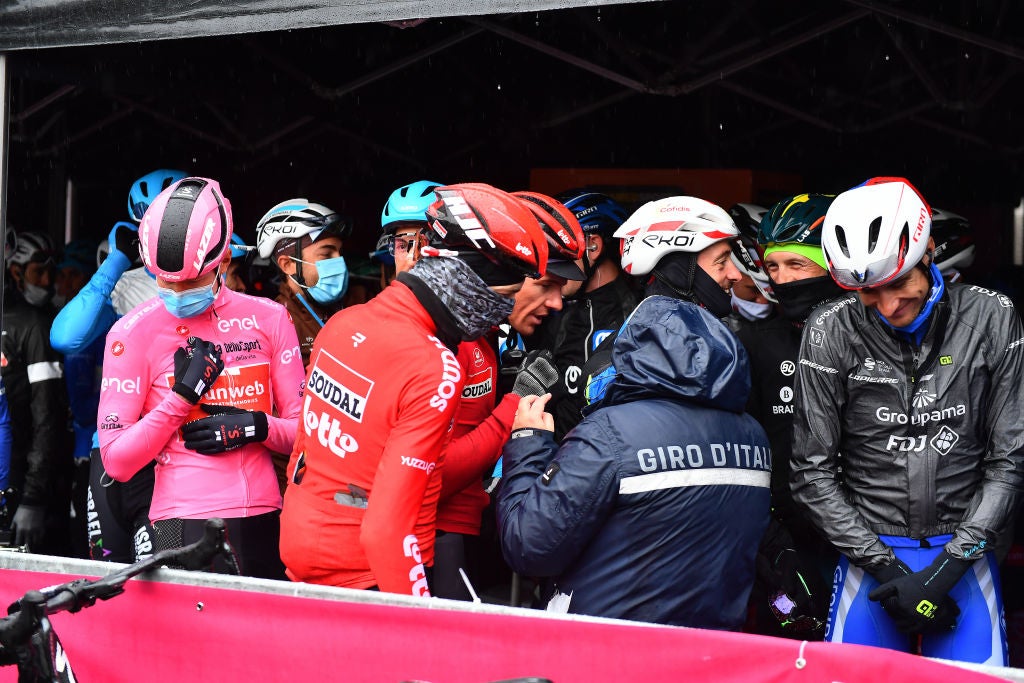Commentary: Riders were right to protest the Giro d'Italia's 258km stage

Riders protested ahead of a rainsoaked 258km stage in 2020. (Photo: Stuart Franklin/Getty Images)
With all due respect to my colleague, James Startt, I have to disagree with his commentary piece today on the rider protest at the 2020 Giro d’Italia.
I think that the riders were correct to protest today’s insane 258-kilometer slog through the rain, and I’m glad that they used their power to shorten the stage to 124km. In fact, I believe that their actions today could be the start of something positive for the entire peloton — a movement to push back against race organizers during an event.
Why?
Let’s be honest: The 2020 Giro d’Italia has been, at times, even more chaotic and unruly than a normal edition of the race. The COVID-19 pandemic is to blame, of course. But we shouldn’t let the race and its organizers completely off the hook for some of the event’s shortcomings this year. And, we should applaud the riders for taking power to push back.
Way back in week one, VeloNews reported that riders were upset with the hotel situation in the Sicilian stages. Brent Bookwalter discussed it on The VeloNews Podcast, and then other riders confirmed what we were told.
Riders stayed in hotels that were packed with offseason tourists, and the common areas in the hotels simply didn’t feel safe. To be perfectly honest, the description we got of the hotel scenes represented a huge red flag in the supposed COVID-19 safety protocols that the sport has been touting for months now. Two days later, two squads left the race after a wave of positive COVID-19 tests.
Why is this situation comparable to Friday’s proposed 258km stage?
In talking with riders about the hotel situation, which may or may not have contributed to the COVID-19 positives, we heard a common refrain. The riders felt like they didn’t have any levers of power to push back against race management and change the hotel situation. Was the rider union, the CPA, the proper vehicle? Could riders take their gripes up with team management?
How, on Earth, do you change the situation? Both avenues felt like a dead end, we heard.
Fast forward to Thursday evening, when riders were informed that the stage — already a long and brutal 253km slog through the rain — had been lengthened by 5km to a whopping 258km. According to Adam Hansen, the lion’s share of the peloton wanted the situation to change. In fact, 16 of the remaining 20 teams thought that the crazy stage, held during a worldwide pandemic, was a bad idea.
“Due to the fatigue of this race and on our immune systems the riders thought it was even more unnecessary to do a 260km stage starting in the rain with a pandemic going on,” Hansen wrote in a note posted to social media.
Hey, that’s the majority, and it’s a sign that most of the WorldTour pros simply felt that race management had pushed them too far. Now, I’ve spoken to enough WorldTour pros in my day to know that they want to do long and punishing races. These are men and women who crave pain and challenge. These riders push themselves to the limit, daily, and crunch their legs up big climbs and then fly down the descents at breakneck speed because they like it. These are extreme and, perhaps, insane people whose tolerance for discomfort is far greater than that of regular folks like us.
I, for one, trust their judgment when it comes to what conditions represent a bridge too far. Was Friday’s stage too much? Well, if most of the riders in the race believe so, then who am I — some schlub sitting in front of a computer screen — to argue with them? Calling riders soft or weak for their decision reminds me of the predictable TV commentary you hear from Charles Barkley or Shaq during NBA Games — that ‘Oh, we were so much tougher in my day,’ type of critique.
Barkley had it tough because he had to go up against Michael Jordan. But guess what? He never had to face the 2017 Golden State Warriors, and LeBron James did.
For all of you non-NBA fans out there, here’s what I’m trying to say. All of us must contend with the situations that present-day life throws our way. Our parents or grandparents may call us weak or soft, but hey, they’re not living our lives.
Sure, we love those photos of Andy Hampsten riding up the Gavia in the snow. But guess what? Andy Hampsten and his cohorts weren’t racing amid a terrifying global pandemic. They didn’t have Doppler Supreme Radar on their smartphones to tell them they were about to race into a scenario fitting for the ice planet Hoth. And, they didn’t have the ability to connect the night before via SMS or text to hash the whole thing out.
We will never know how riders in past generations would handle contemporary situations, because they were operating in the past. Comparing today’s riders to the situation in 1988 is an apples-to-oranges argument that I just don’t trust.
While the last-minute nature of the protest may have irked some fans, I still applaud the riders for taking power into their own hands. It’s my sincere hope that, should future situations arise that make riders feel unsafe, that they feel empowered to push back.